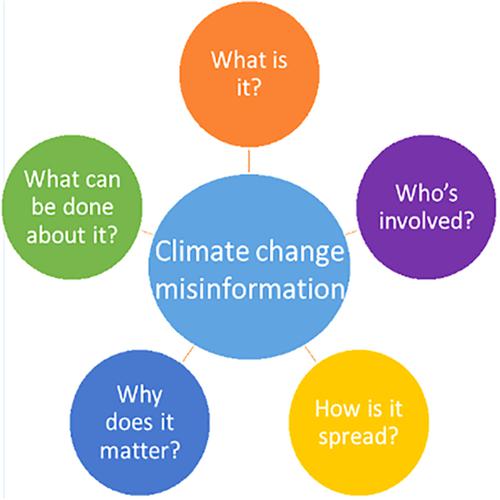当前位置:
X-MOL 学术
›
WIREs Clim. Chang.
›
论文详情
Our official English website, www.x-mol.net, welcomes your feedback! (Note: you will need to create a separate account there.)
Online misinformation about climate change
WIREs Climate Change ( IF 9.2 ) Pub Date : 2020-06-18 , DOI: 10.1002/wcc.665 Kathie M. d'I. Treen 1 , Hywel T. P. Williams 1 , Saffron J. O'Neill 2
WIREs Climate Change ( IF 9.2 ) Pub Date : 2020-06-18 , DOI: 10.1002/wcc.665 Kathie M. d'I. Treen 1 , Hywel T. P. Williams 1 , Saffron J. O'Neill 2
Affiliation

|
Policymakers, scholars, and practitioners have all called attention to the issue of misinformation in the climate change debate. But what is climate change misinformation, who is involved, how does it spread, why does it matter, and what can be done about it? Climate change misinformation is closely linked to climate change skepticism, denial, and contrarianism. A network of actors are involved in financing, producing, and amplifying misinformation. Once in the public domain, characteristics of online social networks, such as homophily, polarization, and echo chambers—characteristics also found in climate change debate—provide fertile ground for misinformation to spread. Underlying belief systems and social norms, as well as psychological heuristics such as confirmation bias, are further factors which contribute to the spread of misinformation. A variety of ways to understand and address misinformation, from a diversity of disciplines, are discussed. These include educational, technological, regulatory, and psychological‐based approaches. No single approach addresses all concerns about misinformation, and all have limitations, necessitating an interdisciplinary approach to tackle this multifaceted issue. Key research gaps include understanding the diffusion of climate change misinformation on social media, and examining whether misinformation extends to climate alarmism, as well as climate denial. This article explores the concepts of misinformation and disinformation and defines disinformation to be a subset of misinformation. A diversity of disciplinary and interdisciplinary literature is reviewed to fully interrogate the concept of misinformation—and within this, disinformation—particularly as it pertains to climate change.
中文翻译:

关于气候变化的在线错误信息
决策者,学者和实践者都呼吁关注气候变化辩论中的错误信息问题。但是,什么是气候变化错误信息,涉及谁,它如何传播,为什么重要以及对此可以采取什么措施?错误的气候变化信息与对气候变化的怀疑,否定和逆势主义密切相关。行为者网络参与资助,产生和放大错误信息。一旦进入公共领域,在线社交网络的特征(例如同质性,极化和回声室)(气候变化辩论中也发现的特征)为错误信息传播提供了沃土。潜在的信仰体系和社会规范,以及诸如确认偏差之类的心理启发法,都是导致错误信息传播的进一步因素。讨论了来自多种学科的多种理解和处理错误信息的方法。这些包括基于教育,技术,监管和心理的方法。没有一个单一的方法可以解决所有有关错误信息的问题,并且都具有局限性,因此需要采用跨学科的方法来解决这个多方面的问题。主要的研究差距包括了解气候变化错误信息在社交媒体上的传播,以及检查错误信息是否扩展到气候警戒主义以及对气候的否定。本文探讨了错误信息和非信息的概念,并将错误信息定义为错误信息的子集。我们对各种学科和跨学科文献进行了审查,以充分探究错误信息的概念,在此范围内,
更新日期:2020-06-18
中文翻译:

关于气候变化的在线错误信息
决策者,学者和实践者都呼吁关注气候变化辩论中的错误信息问题。但是,什么是气候变化错误信息,涉及谁,它如何传播,为什么重要以及对此可以采取什么措施?错误的气候变化信息与对气候变化的怀疑,否定和逆势主义密切相关。行为者网络参与资助,产生和放大错误信息。一旦进入公共领域,在线社交网络的特征(例如同质性,极化和回声室)(气候变化辩论中也发现的特征)为错误信息传播提供了沃土。潜在的信仰体系和社会规范,以及诸如确认偏差之类的心理启发法,都是导致错误信息传播的进一步因素。讨论了来自多种学科的多种理解和处理错误信息的方法。这些包括基于教育,技术,监管和心理的方法。没有一个单一的方法可以解决所有有关错误信息的问题,并且都具有局限性,因此需要采用跨学科的方法来解决这个多方面的问题。主要的研究差距包括了解气候变化错误信息在社交媒体上的传播,以及检查错误信息是否扩展到气候警戒主义以及对气候的否定。本文探讨了错误信息和非信息的概念,并将错误信息定义为错误信息的子集。我们对各种学科和跨学科文献进行了审查,以充分探究错误信息的概念,在此范围内,



























 京公网安备 11010802027423号
京公网安备 11010802027423号